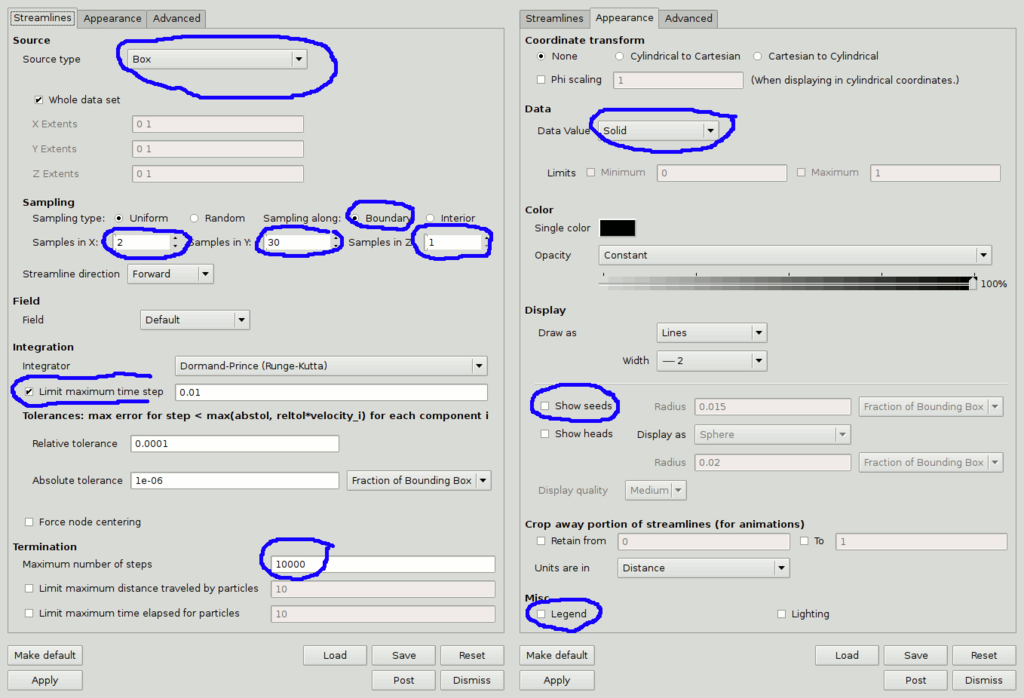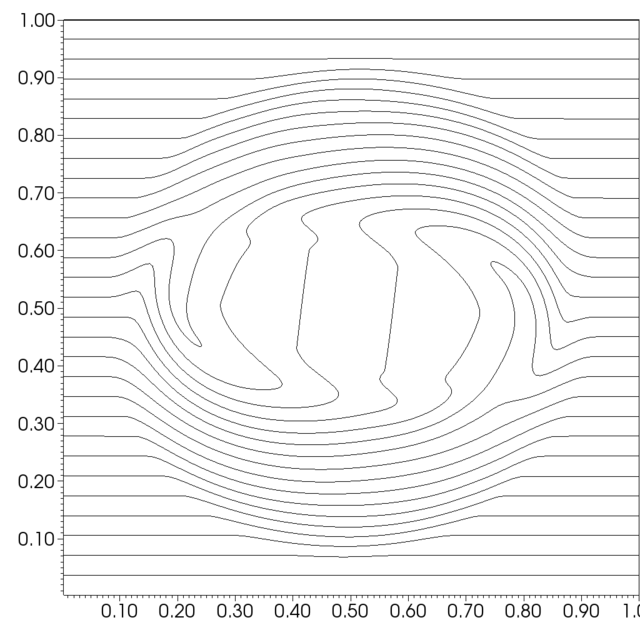Difference between revisions of "Visualizing magnetic field lines"
(fix some layout of code lines) |
(add conn_cmfe example) |
||
| Line 3: | Line 3: | ||
To visualize them, one has to do the "usual VisIt" stuff to get a vector into VisIt. Ie. | To visualize them, one has to do the "usual VisIt" stuff to get a vector into VisIt. Ie. | ||
| − | * open the file in VisIt | + | * if all vector components are in a single set of files then |
| − | * create a new vector Expression (Control/Expressions...) | + | ** open the file in VisIt and |
| + | ** create a new vector Expression (Control/Expressions...) | ||
<pre> | <pre> | ||
{<HYDROBASE--Bvec_lb_0_rb_>,<HYDROBASE--Bvec_lb_1_rb_>,<HYDROBASE--Bvec_lb_2_rb_>} | {<HYDROBASE--Bvec_lb_0_rb_>,<HYDROBASE--Bvec_lb_1_rb_>,<HYDROBASE--Bvec_lb_2_rb_>} | ||
</pre> | </pre> | ||
| − | + | * if the vector components are in different sets of files <code>bvec[0]</code>, <code>bvec[1]</code>, <code>bvec[2]</code> then | |
| + | ** open the <code>bvec[0]</code> file in VisIt and | ||
| + | ** create a new vector Expression (Control/Expressions...) using <code>conn_cfme</code> (see http://visitusers.org/index.php?title=Cmfe_overview, where <code>[0]id</code> stands for 0-delta-iteration i.e. the same iteration in all databases) to combine files | ||
| + | <pre> | ||
| + | {<HYDROBASE--Bvec_lb_0_rb_>, | ||
| + | conn_cmfe(<bvec[1].file_0.h5[0]id:HYDROBASE--Bvec_lb_1_rb_>), | ||
| + | conn_cmfe(<bvec[2].file_0.h5[0]id:HYDROBASE--Bvec_lb_2_rb_>)} | ||
| + | </pre> | ||
| + | :This combines the three components into a single vector (the precise names of the scalars differ from version to version in VisIt). | ||
* add a "Streamline" plot and the "Project" operator | * add a "Streamline" plot and the "Project" operator | ||
* set the streamline options as shown below | * set the streamline options as shown below | ||
Latest revision as of 15:40, 6 November 2019
For the ET MHD paper, I wanted to visualize magnetic field lines as done in figure 4 of DelZannaa 2002. For this I wanted to use VisIt on 2d hdf5 output (unigrid) from Carpet. The data and paremter files can be found in the MHD paper repository [1].
To visualize them, one has to do the "usual VisIt" stuff to get a vector into VisIt. Ie.
- if all vector components are in a single set of files then
- open the file in VisIt and
- create a new vector Expression (Control/Expressions...)
{<HYDROBASE--Bvec_lb_0_rb_>,<HYDROBASE--Bvec_lb_1_rb_>,<HYDROBASE--Bvec_lb_2_rb_>}
- if the vector components are in different sets of files
bvec[0],bvec[1],bvec[2]then- open the
bvec[0]file in VisIt and - create a new vector Expression (Control/Expressions...) using
conn_cfme(see http://visitusers.org/index.php?title=Cmfe_overview, where[0]idstands for 0-delta-iteration i.e. the same iteration in all databases) to combine files
- open the
{<HYDROBASE--Bvec_lb_0_rb_>,
conn_cmfe(<bvec[1].file_0.h5[0]id:HYDROBASE--Bvec_lb_1_rb_>),
conn_cmfe(<bvec[2].file_0.h5[0]id:HYDROBASE--Bvec_lb_2_rb_>)}
- This combines the three components into a single vector (the precise names of the scalars differ from version to version in VisIt).
- add a "Streamline" plot and the "Project" operator
- set the streamline options as shown below
- you can find the full settings in the session file in the rotor repository [2]
- the final plot should look like this:

